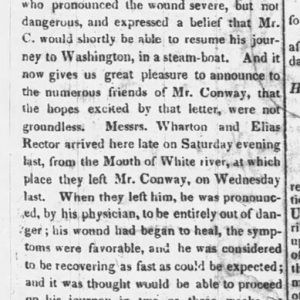calsfoundation@cals.org
Henry Wharton Conway (1793–1827)
Henry Wharton Conway was the delegate to the U.S. House of Representatives from the Territory of Arkansas. He served in the Eighteenth, Nineteenth, and Twentieth Congresses from 1823 until his death in 1827.
Henry Wharton Conway was born on March 18, 1793, near Greeneville, Tennessee. One of ten children born to Thomas Conway and Ann Rector Conway, he received his early education by private tutors before enlisting in the U.S. Army. Serving in the War of 1812, he was commissioned as an ensign (at the time an army rank, but one that was ended after the war) and was promoted to lieutenant in 1813, serving through the end of the war and into peacetime. Conway was a member of the American force that defended Fort Bowyer at Mobile Point, a victory that prevented the British from gaining control of Mobile, Alabama, a base from which they could have cut off trade through Louisiana.
Following his discharge from the army, Conway served as a clerk in the U.S. Treasury Department until he moved to the Missouri Territory in 1818. He relocated again in 1820, this time to the Arkansas Territory. Settling in Arkansas, he was appointed as receiver of public moneys for the Land Office at Little Rock (Pulaski County) in 1820 and 1821. In 1822, he was elected as a delegate from Arkansas to the U.S. House of Representatives, beginning in March 1823; he was reelected twice. As delegate, he advocated in Washington DC on behalf of the territorial government, which sought both the construction of roads as well as federal help in resettling the many Native Americans who were occupying much of the territory’s prime agricultural land.
His final reelection campaign in 1827 was against Robert C. Oden. Characterized by pointed personal attacks, it proved to be one of the most vicious campaigns in Arkansas history. Early on, Oden, a former military officer and lawyer representing the Whig Party, attacked Conway by asserting that he had moved to Arkansas only because of his government job and had no real ties to the area. He also accused Conway of misappropriating funds that were intended for the Quapaw. Conway defended himself, explaining that Robert Crittenden, Conway’s friend and former campaign manager—and himself a prominent political figure who had served as the territorial secretary (a position comparable to lieutenant governor)—had approved the financial arrangement. However, Crittenden denied this, and the electoral campaign soon found itself wrapped up in a personal vendetta, with charges being traded between Conway and Crittenden while outsiders took sides and the local newspapers printed letters to the editor from supporters of each side.
On election day, Conway was victorious. His experience as Arkansas’s delegate, coupled with the work he had done helping build roads and institutions for the developing territory, carried him to victory over Oden. However, the clash between Conway and Crittenden continued, leading Crittenden to challenge Conway to a duel. Ironically, only a short time beforehand, a duel between Ambrose Sevier and Thomas Newton—with each of them defending the honor of Crittenden and Conway, respectively—had been fought to no result, with their seconds stepping in and ending it after the first shots were fired.
However, that forerunner did not prevent the main event, and on October 29, 1827, Conway and Crittenden faced each other near the meeting point of the Mississippi and White rivers. They set themselves at the agreed upon distance and fired. Conway’s shot only grazed Crittenden’s coat, but he was hit in the chest by Crittenden’s bullet. Taken to the home of a local resident, Conway lingered for almost two weeks before dying on November 9, 1827. Conway had left behind a paper and testimony explaining the circumstances that led to the duel, and the challenge letter itself was published in the Arkansas Gazette. All of this led to Crittenden, as well as one of his aides, being indicted, but all the charges were ultimately dropped.
Conway was interred in the Arkansas Post Cemetery. Conway County was named for him.
For additional information:
“Henry Wharton Conway” Biographical Directory of the United States Congress. http://bioguide.congress.gov/scripts/biodisplay.pl?index=C000712 (accessed September 8, 2021).
White, Lonnie J. “The Election of 1827 and the Conway-Crittenden Duel.” Arkansas Historical Quarterly 19 (Winter 1960): 293–313.
William H. Pruden III
Ravenscroft School
 Politics and Government
Politics and Government War of 1812
War of 1812 Conway-Crittenden Duel Story
Conway-Crittenden Duel Story 



Comments
No comments on this entry yet.